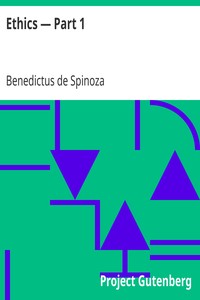Ethics — Part 1 by Benedictus de Spinoza
"Ethics — Part 1 by Benedictus de Spinoza" is a philosophical treatise written in the 17th century, specifically during the early modern period. The book is a foundational work in the field of Western philosophy, particularly known for its exploration of metaphysics and ethics. Spinoza examines the nature of God, existence, and reality, offering a rational understanding of the universe that intertwines his moral philosophy with his metaphysical views. In "Part 1:
Concerning God," Spinoza lays out his definitions, axioms, and propositions regarding the nature of God and substance. He argues that God is an absolutely infinite being whose essence necessarily includes existence. He posits that there cannot be two substances with the same attributes and that everything that exists does so through God, asserting that all things depend on the divine for their essence and existence. Spinoza further contends that God's will is not free in the human sense but is bound by the necessity of his nature, driving home the idea that everything in the universe unfolds according to divine laws rather than random chance. This work challenges traditional views of God and existence, positioning Spinoza as a pivotal figure in the development of philosophical thought. (This is an automatically generated summary.)
Read now or download (free!)
| Choose how to read this book | Url | Size | ||||
|---|---|---|---|---|---|---|
| Read online (web) | https://sendtokindle.compellingsciencefiction.com/ebooks/919.html.images | 113 kB | ||||
| EPUB3 (E-readers incl. Send-to-Kindle) | https://sendtokindle.compellingsciencefiction.com/ebooks/919.epub3.images | 100 kB |
Send
to kindle email: |
|||
| EPUB (no images, older E-readers) | https://sendtokindle.compellingsciencefiction.com/ebooks/919.epub.noimages | 100 kB | ||||
| Kindle | https://sendtokindle.compellingsciencefiction.com/ebooks/919.kf8.images | 192 kB | ||||
| older Kindles | https://sendtokindle.compellingsciencefiction.com/ebooks/919.kindle.images | 183 kB | ||||
| Plain Text UTF-8 | https://sendtokindle.compellingsciencefiction.com/ebooks/919.txt.utf-8 | 101 kB | ||||
| Download HTML (zip) | https://www.gutenberg.org/cache/epub/919/pg919-h.zip | 98 kB | ||||
| There may be more files related to this item. | ||||||
About this eBook
| Author | Spinoza, Benedictus de, 1632-1677 |
|---|---|
| Translator | Elwes, R. H. M. (Robert Harvey Monro), 1853- |
| Title | Ethics — Part 1 |
| Note | Reading ease score: 54.5 (10th to 12th grade). Somewhat difficult to read. |
| Note | Wikipedia page about this book: https: //en.wikipedia.org/wiki/Ethics_(Spinoza_book) |
| Credits | Produced by an anonymous Project Gutenberg volunteer |
| Language | English |
| LoC Class | B: Philosophy, Psychology, Religion |
| Subject | Ethics |
| Category | Text |
| EBook-No. | 919 |
| Release Date | May 1, 1997 |
| Most Recently Updated | Apr 14, 2013 |
| Copyright Status | Public domain in the USA. |
| Downloads | 248 downloads in the last 30 days. |
| Project Gutenberg eBooks are always free! | |

